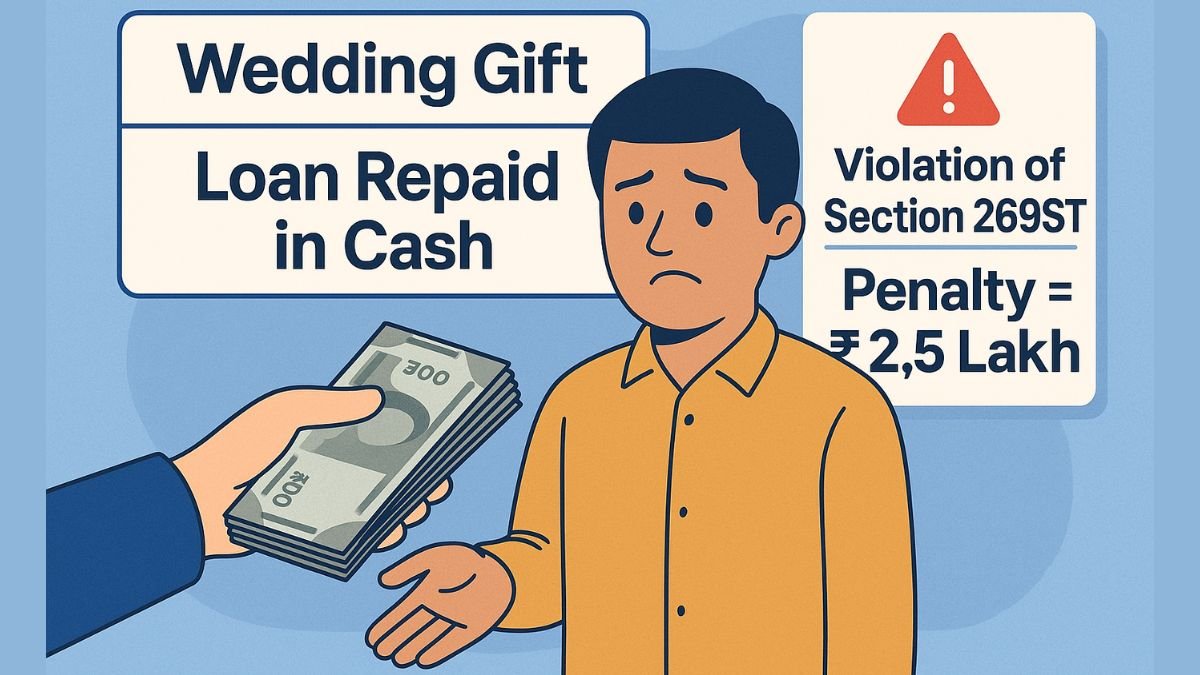
In a country like India, where cash transactions have long dominated, the fight against black money and unaccounted income has been a critical goal of the government. Among several strategic reforms, Section 269ST of the Income Tax Act stands out as a powerful weapon introduced to regulate cash transactions and curb black money in the system.
This section was introduced via the Finance Act, 2017, & has since become a cornerstone in limiting large cash dealings and encouraging digital payments and traceable financial systems.
💡 What is Section 269ST of the Income Tax Act?
Section 269ST of the Income Tax Act prohibits the receipt of a sum of ₹2 lakh or more in cash by any person in a day, or against a single transaction or from a single person relating to one event or occasion.
In other words, no person shall receive an amount of ₹2 lakh or more:
- From a person in a single day, or
- In respect of a single transaction, or
- Concerning one event or occasion of a person.
Even if the cash is received in smaller parts on different days, if the transaction relates to the same deal or event, Section 269ST applies.
🧾 Applicability of Section 269ST
This section applies to individuals, HUFs, firms, companies, trusts, NGOs, AOPs, and BOIs—practically everyone except the government, banking companies, post offices, and cooperative banks.
It’s also worth noting that section 269ST of the Income Tax Act is applicable irrespective of the nature of the transaction—it could be a gift, a loan, sale proceeds, or any service fee. This provision does not differentiate between personal and business transactions.
❌ Examples of Transactions Where Section 269ST Applies
Let’s look at some realistic examples:
- A jeweller sells gold worth ₹3.5 lakh and receives the entire amount in cash—Violation.
- An individual gifts ₹2.2 lakh in cash to his friend on marriage—Violation.
- A doctor receives ₹2.5 lakh in cash for a surgery from a patient—Violation.
- A customer purchases a bike for ₹1.9 lakh in cash & insurance for ₹15,000 in cash separately, but both from the same seller—Violation, since it relates to a single transaction.
The law restricts receiving cash payments above ₹2 lakh, even if they are split or structured to evade this provision. "
⚖️ Penalty for Violation of Section 269ST
If any person violates Section 269ST, the penalty under Section 271DA is equal to the amount received in contravention.
So, if someone unlawfully receives ₹5 lakh in cash, the penalty can also be ₹5 lakh—a 100% penalty.
This clause alone makes it one of the strictest anti-cash laws under the Income Tax Act.
🎯 Purpose Behind Introducing Section 269ST
The Government’s objective with this provision is crystal clear:
- To curb black money and unreported income.
- To regulate cash transactions and encourage traceable payment methods like cheques, bank transfers, UPI, etc.
- To increase tax compliance by ensuring every high-value transaction leaves a digital footprint.
This provision is aligned with India’s larger vision of becoming a cashless economy and increasing transparency in financial reporting.
📌 Section 269ST and Business Practices
For businesses, especially in sectors like real estate, jewellery, and healthcare, where cash dealings were once the norm, Section 269ST has redefined the rules of engagement.
Tax consultants, chartered accountants, and business owners need to educate clients about this restriction on cash receipts above ₹2 lakh.
Many unaware taxpayers have faced heavy penalties for violating the provision unknowingly—don’t let ignorance be costly.
✅ Best Practices to Stay Compliant
- Avoid receiving cash of ₹2 lakh or more for any sale, service, or event.
- Prefer banking channels for all high-value payments.
- Keep clear invoice documentation to explain the source & method of payment.
- Educate your team & clients about the risk and penalty for violation of Section 269ST.
- Maintain transaction records & bank reconciliation statements for future scrutiny. "
🧠 Conclusion
Section 269ST of the Income Tax Act is not just a legal clause—it’s a serious commitment by the Indian Government to eliminate black money and boost financial transparency.
By prohibiting the receipt of ₹2 lakh or more in cash, it not only deters tax evasion but also builds a compliant, digitally empowered economy. As a taxpayer, your safest bet is to move away from cash & stick to accountable, traceable transactions.











